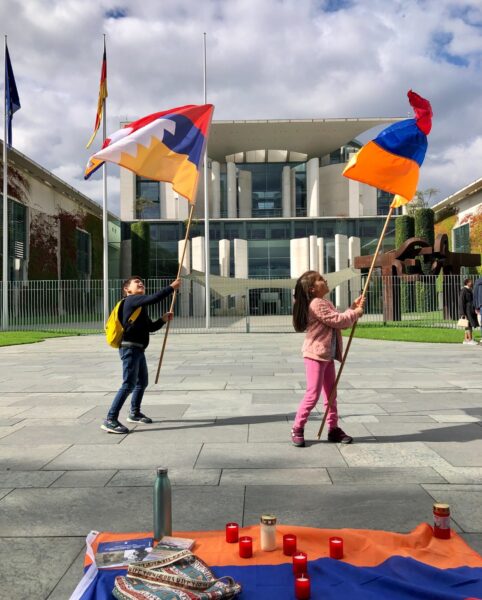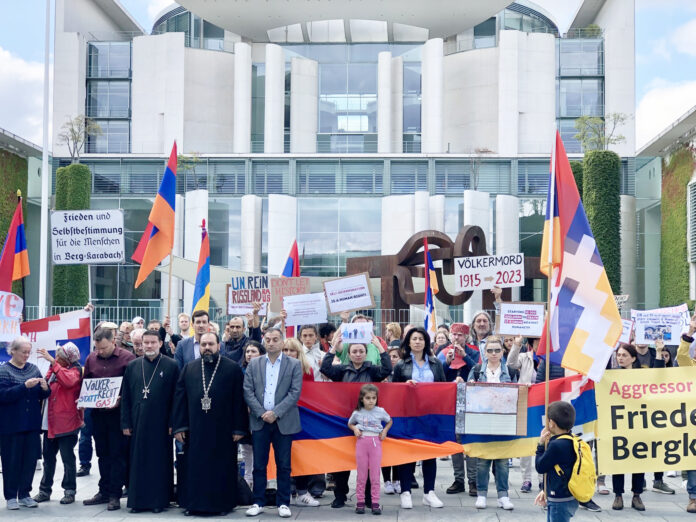BERLIN — The demonstration in Berlin on September 23 had been organized weeks earlier; the Diocese of the Armenian Church in Germany, the Central Council of Armenians in Germany, along with two leading human rights groups, the Society for Threatened Peoples (GfbV) and Against Genocide, for International Understanding (AGA), had joined forces to awaken German public opinion to the impending genocide against Artsakh Armenians under Azerbaijan’s blockade. That was the original theme. But on September 19, when Azerbaijani armed forces launched their military aggression, the Armenian and German associations shifted their focus to address the dramatically altered situation.
Three hundred people gathered in front of the German Chancellery, office of Olaf Scholz, with posters, flags and a formal petition. Leaders of the sponsoring groups briefly spoke. Gerayer Koucharian (AGA), a second generation diasporan Armenian whose father’s family came from Artsakh, and who grew up in Iran, said he had always “previously thought the Armenian genocide belonged to the past.” But after having witnessed Azerbaijan’s decades-long destruction of Armenian culture, he had to abandon that belief. Now, faced with the threatened genocide of Artsakh Armenians, he fears that the vision he once read about 40 years ago in an article by a Pan-Turkist could become reality. That piece envisioned a future in which Azerbaijan would conquer Armenia and leave to its people nothing but Echmiadzin, and a couple of villages in the vicinity.
GfbV Director Roman Kühn urged Scholz to launch political actions against Azerbaijan. Greetings were read from Action of Christians for the Abolition of Torture (ACAT), which has been petitioning the German government and the Azerbaijan embassy. Tessa Hofmann (AGA), and ZAD director Jonathan Spangenberg addressed further aspects.

Hofmann quoted a plea she had recently received via Facebook from an Armenian woman, who wrote: “Children and elderly in Artsakh are in a concentration camp. There is no light, no warmth, no food. Genocide is occurring. My family cannot flee, they are being held by force here. Help us, so that people can leave this Hell!” Hofmann argued the urgent need for sanctions as the only means to force Baku to respond; for security troops and international guarantees; and for the right to self-determination.
Spangenberg chronicled the events leading up to the current aggression, again condemning the lack of effective political intervention. He singled out one positive statement made by Scholz, on March 2 of this year, during Prime Minister Pashinyan’s state visit. Scholz’s position was that the conflict could be resolved only based on respect for the principles of territorial sovereignty of both countries, as well as the inalienable right of Nagorno-Karabakh citizens to self-determination.
The concrete measures for Scholz to take were listed in an appeal that delegates delivered to the Chancellor’s office, together with a letter. They urged to him to demand the withdrawal of Azerbaijani troops from the autonomous Republic of Nagorno-Karabakh, promote deployment of ceasefire observers, take a stand on Azerbaijan’s crimes against the Karabakh people, promote an independent international investigation of the situation, sanction those responsible, namely, President Ilham Aliyev and Rovshan Najaf, President of state oil company SOCAR, and initiate deployment of international peacekeeping troops. Primary among their demands were sanctions against the Aliyev regime, and German support for the right to self-determination for the people of Artsakh.









